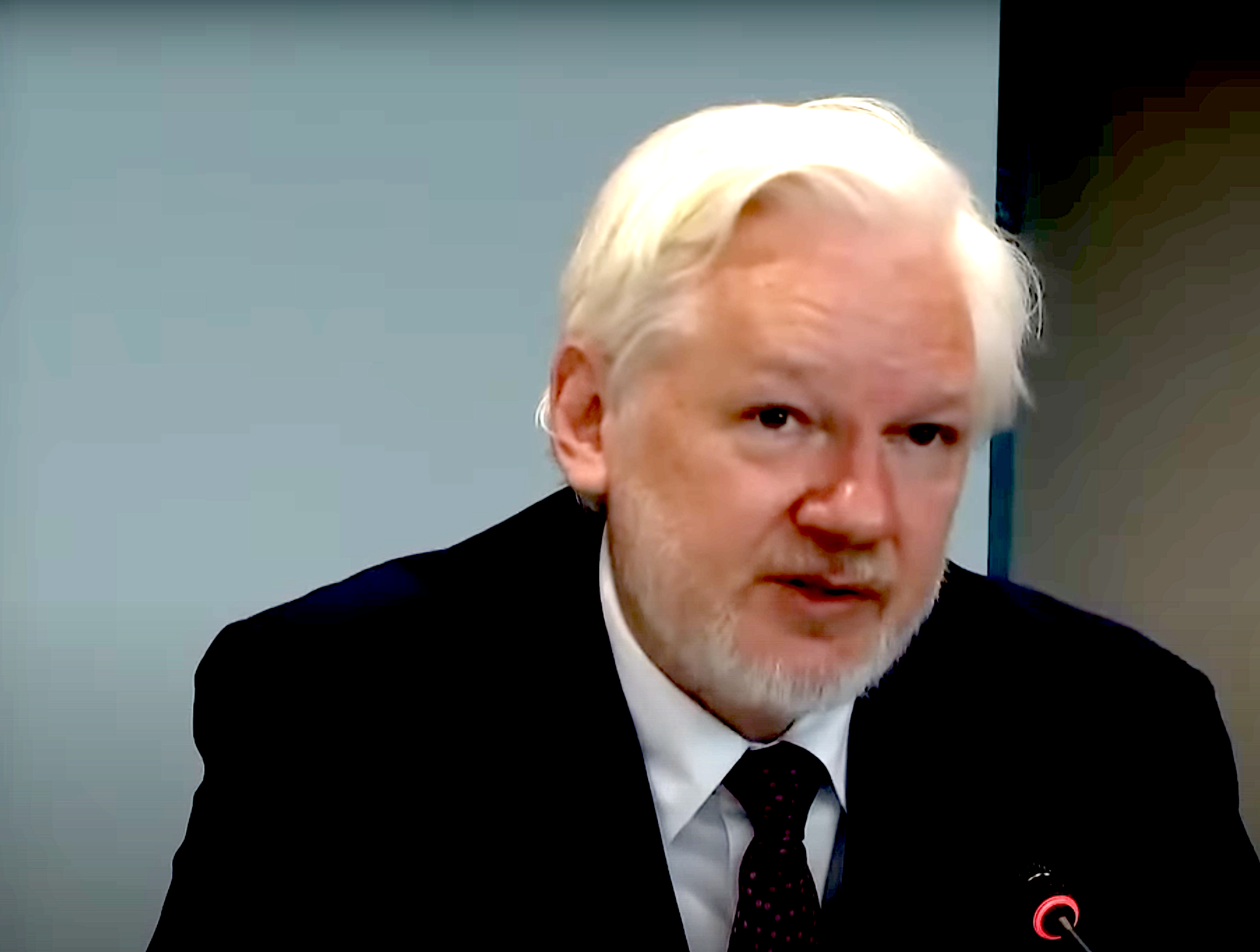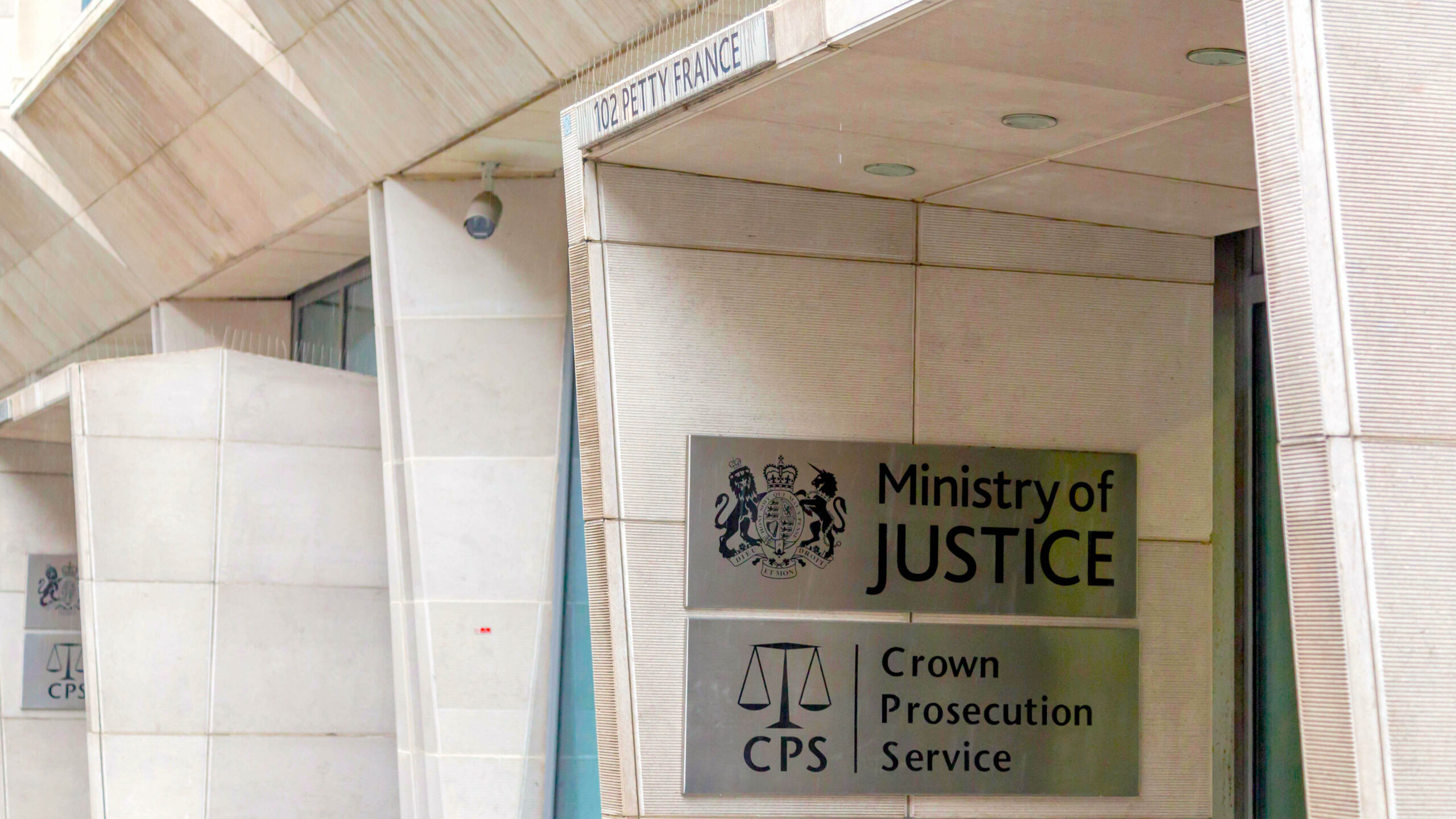Italian journalist Stefania Maurizi has been in court trying to get some missing emails — or data about them — that could further expose the political motivation behind the prosecution of the WikiLeaks publisher.

Julian Assange on Oct. 1, addressing the Parliamentary Assembly of the Council of Europe, which recognizes him as a political prisoner. (PACE video still)
By Joe Lauria in Washington
and Mohamed Elmaazi in London
Special to Consortium News

 A tribunal in Britain is set to decide whether to order the government’s Crown Prosecution Service (CPS) to prove it deleted emails that may have covered up more evidence of a politically motivated prosecution of Julian Assange.
A tribunal in Britain is set to decide whether to order the government’s Crown Prosecution Service (CPS) to prove it deleted emails that may have covered up more evidence of a politically motivated prosecution of Julian Assange.
The three judges heard arguments on Sept. 24 in the nearly decade-long freedom of information saga regarding the emails that top British prosecutors say were deleted.
They involved an exchange with Sweden during a Swedish prosecutor’s attempt, beginning in 2010, to extradite the WikiLeaks publisher from Britain.
Assange was wanted in Sweden for questioning during a preliminary investigation into allegations of sexual assault, which was dropped three times, definitively in 2017. He was never charged. After losing his battle against extradition to Sweden at the U.K. Supreme Court, Assange took refuge in the Ecuadorian embassy in June 2012, fearing that Sweden would send him to the United States.
Assange spent seven years in the embassy protecting himself from arrest by British police until April 2019, when police dragged him from the diplomatic mission and threw him into London’s maximum security Belmarsh prison.
It was only when the U.S. realized it would lose on appeal after a four-year extradition battle that the Department of Justice cut a plea deal with Assange who was released on June 24 and returned to his native Australia.
Assange had been charged in the United States under the Espionage Act for possessing and publishing defense information, which revealed evidence of U.S. war crimes.
Britain took an active role in Assange’s prosecution. Its Crown Prosecution Service sought to stop Sweden from going to the embassy to question him.

Stefania Maurizi. (X/Twitter)
Seeking to learn more about Britain’s role against Assange, Italian investigative journalist Stefania Maurizi first made a Freedom of Information Act (FOIA) request in 2015 for all emails between the British and Swedish governments concerning Assange.
Some of the emails she obtained showed political motivation on the part of the lead British prosecutor, Paul Close.
One email Maurizi obtained from the Swedish Prosecution Authority (SPA) revealed that Close appeared to be pressuring Swedish prosecutors to continue seeking Assange’s extradition instead of dropping the case or questioning him at the Ecuadorian embassy, where Assange had been granted asylum.
“Please do not think this case is being dealt with as just another extradition,” Close wrote to the SPA in January 2011, according to one of the emails obtained by Maurizi.
In another email later that month, Close wrote, “My earlier advice remains, that in my view it would not be prudent for the Swedish authorities to try to interview the defendant [Julian Assange] in the UK.”
“Don’t you dare get cold feet!!!,” a CPS official wrote to Marianne Ny, Sweden’s director of public prosecutions, in August 2012.
After Maurizi noticed a sizeable gap in the emails released to her she filed another FIOA seeking to obtain the missing emails.
The CPS first claimed that it had destroyed the emails. It said that when Close retired, his account along with his emails, were automatically destroyed.
But Maurizi did not buy it. She asked the court at the hearing last month to order the CPS to turn over “metadata” — data about data, such as file creation and modification dates, email sender and recipient addresses, timestamps, email routing information, keywords, and subject lines — proving the emails really were deleted and when.
“We have NO certainty whatsoever” that the emails were destroyed, Maurizi wrote in a message to Consortium News. Maurizi is in court because she believes the allegedly deleted emails could provide additional evidence of a politically motivated prosecution of Assange.
She also wants metadata on a CPS document that it says is from 2012 explaining the CPS’ email deletion policy, which was only sent to her in 2023.
The supposed 2012 policy document says that 30 days after an email account is disabled, the “email data” associated with it “will be automatically deleted and no longer accessible.”
“How is it possible that they provided this document only in 2023, after multiple requests, multiple appeals, no-one ever mentioned it or knew about it?” Maurizi told CN.
Such a policy does not explain why thousands of emails related to an ongoing case would be deleted.
In order to figure out whether the 2012 policy document on deletions is genuine, Maurizi requested the relevant metadata of the file. She wants to make sure it was not created years later as an attempt at retroactively justifying the deletion of Close’s emails.
‘When, How & Why’ Were the Emails Deleted?
Maurizi, who travelled to London from Rome to attend the Sept. 24 hearing at the First-Tier Tribunal (General Regulatory Chamber), is challenging the ongoing failure of the CPS to respond adequately to her December 2019 FOIA about the missing emails.
“[The CPS] didn’t search for the information about the deletion of the account,” Maurizi told Consortium News, after the hearing was over. “There must be correspondence relating to the deletions. When we asked for this information they said everything was done according to standard procedure.”
Deborah Hillary, head of Service Management at the CPS, testified during cross-examination at the hearing that the CPS never instructed her to locate information on the system that would explain “when, how and why the emails of the CPS lawyer, Mr. Paul Close, were deleted.”
Instead, Hillary was only told to search for any policy guidance related to deleting email accounts. That was the alleged 2012 document that was sent to Maurizi only last year.
Estelle Dehon KC, who represented Maurizi at the hearing, argued that Hillary’s testimony gives clear evidence the CPS did not conduct a proper search for the information Maurizi sought in 2019 — namely any information pertaining to the circumstances that resulted in Close’s emails being deleted.
Unsatisfactory Explanations

(David Pearson, CC BY-SA 2.0, Wikimedia Commons)
It is simply “not credible” Maurizi’s lawyer argued, that Close neither sent nor received emails to Swedish prosecutors when Sweden issued the arrest warrant for Assange; when Assange took refuge in the embassy; and when he was granted asylum by Ecuador.
“[I]t has never been established that there was anything untoward in those gaps, that there were emails that weren’t published,” argued Rory Dunlop KC, on behalf of the prosecution authority, during his closing remarks.
“The CPS are keen to make clear that it has never been accepted and [it has] never been established one way or another,” he insisted. Over the years, in response to FOIA requests and appeals, the CPS’ position on the deletion of Close’s account has varied.
For example, in 2017, after Maurizi challenged the gap in the emails, a CPS employee said in a witness statement that, “If there ever existed further emails they were not printed off and filed” and therefore “are no longer in the possession of the CPS.”
According to an article by Maurizi in the Italian daily il Fatto Quotidiano, five years later, the CPS said in response to a separate FOIA request from Labour MP John McDonnell that “deletion of an email account of a former member of staff at the time would not have led to the deletion of emails held on the case file.”
The CPS also admitted to McDonnell that they are only aware of one other case in the last decade which resulted in the premature destruction of case materials, according to Maurizi’s article.
The Sept. 24 tribunal also heard that the CPS’ Records Management Manual states that general correspondence “should be retained in the case file within five years from the date of the most recent correspondence,” which would not allow for deletion upon retirement by the prosecutor on the cass.
Does Metadata Fall Within the Scope of FOIA ?
The CPS and the Information Commissioner’s Office (ICO), the British body mandated to uphold information rights, both say that metadata falls outside of the scope of FOIA requests and that allowing people to request metadata from public authorities would be too onerous.
Maurizi is betting the tribunal will agree with her that metadata is clearly information that can be requested under the Act and which can clearly be provided with little difficulty. If she succeeds, future FOIA requests will also be able to demand metadata if and when an individual thinks it may be useful.
Hillary, who was called to testify for the CPS, freely admitted to the tribunal that she could easily provide the metadata Maurizi requested and that she would be happy to do so, as long as any information which identified individuals is redacted.
The tribunal will also consider whether to “order the CPS to carry out a proper, full search for information held” as to “when, how and why?” the thousands of emails were allegedly deleted while Assange’s Swedish extradition case was still very much active.
No date has yet been set for the announcement of the tribunal’s decision.
CORRECTION: An earlier version of this article attributed the specific quote, “Don’t you dare get cold feet!!!,” to Paul Close. In fact the sender in that email was redacted in the document released to Maurizi.
Joe Lauria is editor-in-chief of Consortium News and a former 25-year U.N. correspondent for The Wall Street Journal, Boston Globe, and other newspapers, including The Montreal Gazette, the London Daily Mail and The Star of Johannesburg. He was an investigative reporter for the Sunday Times of London, a financial reporter for Bloomberg News and began his professional work as a 19-year old stringer for The New York Times. He is the author of two books, A Political Odyssey, with Sen. Mike Gravel, foreword by Daniel Ellsberg; and How I Lost By Hillary Clinton, foreword by Julian Assange.
Mohamed Elmaazi studied law at the School of Oriental and African Studies in London and has contributed to numerous news outlets, including Jacobin, The Dissenter, The Canary, Open Democracy, The Grayzone and The Real News Network. He has covered all of Julian Assange’s extradition hearings.

Those interested in Stefania’s work who missed the CN Live interview will appreciate reviewing it to see the amazing work she had done! hxxps://www.youtube.com/watch?v=u9ZTHtwSUm0
Thank You CN
As a Scot, and especially under the heel of a government headed by the knighted former director of the CPS, all I can say is, once again, Perfidious Albion.
Quick reminder: US admin initiated Assange prosecution, the “fry cook” seeking reelection
Thanks yet again to CN, Joe Lauria, as well as Stephania Maurizi and Mohamed Elmaazi!!!
And YES “evelync”….everyone concerned with this corrupt and tawdry miscarriage of justice involving the intentionally false inquisitions of Julian Assange under the guise of lawful prosecutions of either civil and/or criminal international law deserves much better! We must continue to DEMAND a public redress of this grievous violation of civilized behavior by all the direct participants and their sycophant co-conspirators.
As Usual,
EA
Exactly – Abuses will never stop and will only continue until the people bring accountability back and keep demanding and working to bring it back into the foundations of governance and society.
Thank you Joe Lauria for this encouraging news of Stephania Maurizi’s dogged pursuit of the emails regarding what surely was pressure on Sweden to lasso journalist Julian Assange in order for the U.S. to get their claws on him.
This is something that, surely, many many people knew in their bones had to be going on. It seemed obvious.
But the proof of course is in the pudding. Thanks again to Stephania!!!
The shoddy pressuring of Sweden to serve the interests of those in the U.S. – the political and security hacks/liars – was sooooo glaring.
Shame on Sweden for their cowardice and the U.S. national security state for its unending evil.
We deserve better.
Maurizi is an honorable woman.
Thanks to her intelligence, courage, fortitude and persistence on behalf of the greatest journalist who ever was and is.
Thank you Julian and all those who fought for you and continue to fight.
This is an unending battle.